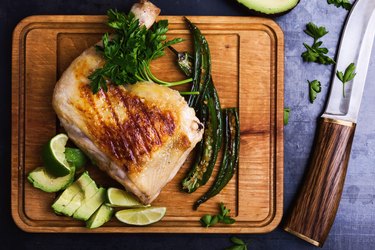
Whether you're trying to clean up your diet or lose a few pounds, poultry can be a healthy option, from baked chicken thighs to our Keto Chicken Enchiladas. While baked chicken and grilled chicken have similar nutritional values, one is better than the other.
Tip
Grilled chicken is considered healthy, but the cooking process may pose some risks. Cooking meat, fish or poultry at temperatures above 300 degrees Fahrenheit promotes the formation of toxic compounds, such as heterocyclic amines.
Video of the Day
How you cook your food is just as important as what you eat. Grilled chicken, for example, has slightly fewer calories than its baked counterpart, but this doesn't mean it's healthier. The chemicals formed when meat is cooked at high temperatures are toxic to the human body and may cause adverse effects in the long run.
Video of the Day
Baked Versus Grilled Chicken Calories
Rich in protein and low in calories, chicken is the go-to choice for many dieters and healthy eaters. Whether you opt for baked or grilled chicken breast, you'll get over 30 grams of lean protein and zero carbs. While both cooking methods preserve its flavor, baking is a safer choice.
According to the National Cancer Institute, cooking meat at high temperatures, such as when grilling over an open flame, may alter its composition and promote the formation of toxic compounds. Heterocyclic amines (HCAs), for example, are classified as potential human carcinogens by the U.S. Department of Health and Human Services.
These chemicals tend to form when grilling, frying or broiling meat, fish or poultry. Polycyclic aromatic hydrocarbons (PAHs), which are just as dangerous, may occur in smoked foods and meats cooked at high temperatures.
Both types of compounds can cause DNA damage after being metabolized by certain enzymes in the body. The activity of these enzymes varies among individuals, which explains why some people are more prone to the side effects of HCAs and PAHs than others.
Grilled chicken and baked chicken have a similar nutritional value, though. A 3.5-ounce serving of grilled chicken breast provides 165 calories, 3.8 grams of fat and 31 grams of protein. It's also a good source of iron, magnesium, potassium, zinc and B-vitamins. Baked chicken breast, by comparison, boasts 151 calories, 3.1 grams of fat and 30.5 grams of protein per serving.
Read more: 12 Tips to Keep Chicken Tender and Tasty
Baking tends to give food a more delicate texture and taste. Grilling, on the other hand, produces a bolder flavor and allows fat to drip off the meat, reducing its calorie count. However, baking can be just as healthy as long as you don't add oil, butter and other fats.
Make Grilling Safer and Healthier
Grilling isn't the safest way to cook chicken, but you can make it healthier. The National Cancer Institute recommends microwaving the meat before cooking it at high temperatures. This will help decrease the cooking time and hence reduce HCA formation, as reported in a June 2013 study in Meat Science.
Another trick you can use is to turn the meat over frequently while grilling it. Once it's done cooking, remove any charred parts before serving. Don't use the meat drippings to make gravy and sauces.
To further reduce the formation of HCAs, marinate the chicken for about half an hour before grilling it, advise the experts at Columbia University Irving Medical Center. Also, consider grilling smaller, leaner cuts of meat as they will cook faster and produce fewer toxins than larger cuts. Watch your food at all times to prevent overcooking. Ideally, grill it until its internal temperature reaches 165 F.
Grilling time depends largely on the size of the meat. The USDA Food Safety and Inspection Service recommends grilling boneless breast halves for six to eight minutes on each side, bone-in chicken breast halves for 10 to 15 minutes on each side and drumsticks or wings for eight to 12 minutes per side. If you're cooking chicken thighs, keep them on the grill for 10 to 15 minutes on each side.
Certain herbs and spices may help decrease HCA formation while adding flavor to your meal. Ground black pepper, for instance, may inhibit these chemicals, states J. Scott Smith, an animal sciences and industry professor at Kansas State University. He recommends mixing it with other spices rich in antioxidants and then adding it to marinades or directly to the meat. Rosemary has similar effects.
Surprisingly, HCAs and PAHs don't form on grilled fruits or veggies. The antioxidants in plant-based foods inhibit toxin formation when grilling meat and may protect against cancer. On top of that, some fruits and vegetables can make the chicken taste a lot better. Grilled pineapple, kiwi, mango, zucchini, asparagus and even watermelon all go well with poultry.
- National Cancer Institute: "Chemicals in Meat Cooked at High Temperatures and Cancer Risk"
- U.S. Department of Health and Human Services: "Substances Listed in the Fourteenth Report on Carcinogens"
- USDA: "Grilled Chicken Breast"
- USDA: "Baked Chicken Breast"
- Meat Science: "Effects of Varying Degrees of Doneness on the Formation of Heterocyclic Aromatic Amines in Chicken and Beef Satay"
- Columbia University Irving Medical Center: "6 Grilling Tips to Avoid Carcinogens"
- USDA Food Safety and Inspection Service: "Chicken From Farm to Table"
- Kansas State University: "Good News for Grilling: Black Pepper Helps Limit Cancerous Compounds in Meat, Study Shows"
- Winnipeg Regional Health Authority: "Grilled to Perfection: Reducing Barbecue Health Hazards"